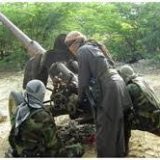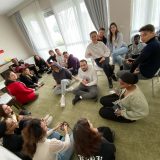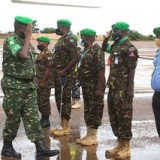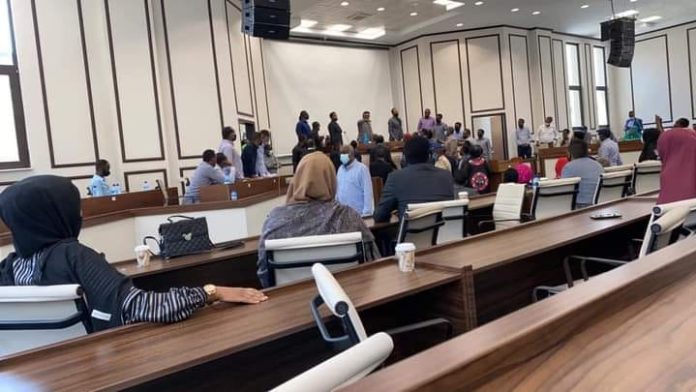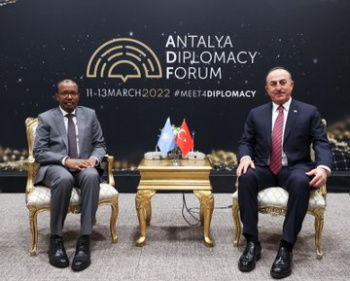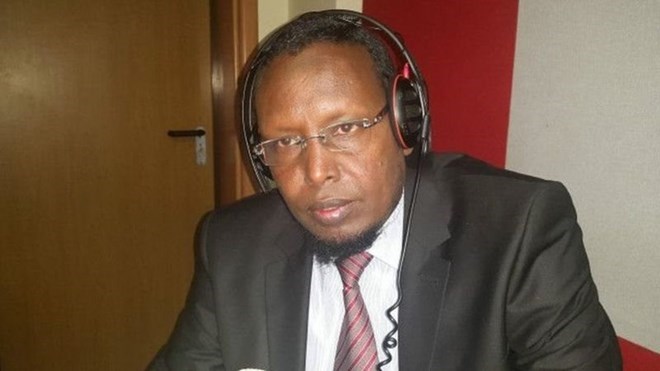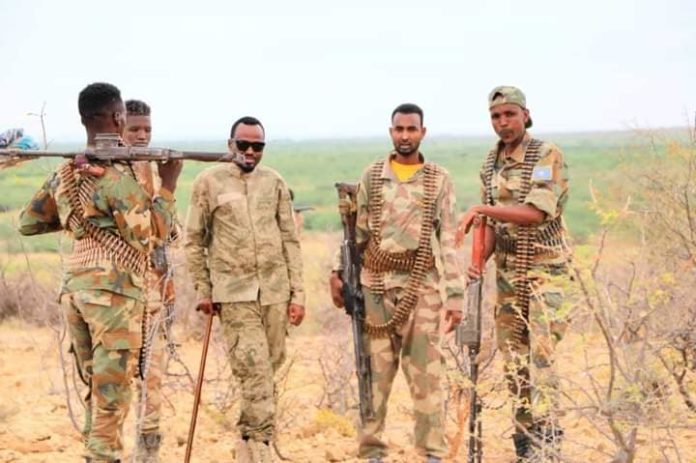Djiboutian women at the gym
![Nasra lifts weights at a gym in Djibouti with her colleague. [Rachel Pieh Jones / Sahan Journal]](http://mukhtaryare.wpengine.netdna-cdn.com/wp-content/uploads/2015/04/nasra-at-gym4-500x333.jpg)
Kebabs roasted over a charcoal grill outside the men’s gym on Rue de Guelleh Batal. The cook used baguettes to slide smoking pieces of beef off the sticks, then loaded the bread with onions, tomatoes, French fries, and a generous dollop of mayonnaise. He wrapped aluminum foil around the bread to keep it warm and added it to a growing pile on the side of the grill. If he worked at a precise pace he would have all the food prepared before the evening’s last call to prayer. The men would finish lifting weights and pour out of the gym to purchase a sandwich on their way to the mosque or home.
Nasra would not buy any food, not tonight or any other night. She didn’t have the money to spare and didn’t want to draw any extra attention. The owner of the gym welcomed her and none of the men bothered her but she maintained as low a profile as possible, one of two females in a man’s domain.
Keeping a low profile meant Nasra lifted weights in the back room and walked there with her eyes on the ground. The first night she went Nasra said, “Everyone is looking at us,” and laughed nervously.
“Us” included Nasra, Cintia Guzman, and Nasra’s teammate Mohammed. Guzman, from Argentina, coached the Girls Run 2 running team that Nasra belonged to. Former Olympic sprinter Fathia Ali Bouraleh was the assistant coach and the team included a few young boys like Mohammed. Girls Run 2 was the only club in town focused primarily on developing female runners, though Guzman could never turn away a boy if he asked to join. Finding training locations was one of the team’s many challenges, which made Nasra especially grateful for this weight room.
They used to lift weights at the Hassan Guleed Stadium but it was under construction, finished only recently in late winter of 2015, and not yet ready for running clubs to train there. The Girls Run 2 team moved to the Municipal Stadium where they were allowed to use the weight room but couldn’t run on the track or use the cement bleachers for sprint work. The difficulty with the Municipal Stadium was that most of the machines were either broken or missing the weights or the pins. When the price there was raised for girls, the coaches started looking for another place to train.
Sometimes they ran at the La Siesta beach near the Sheraton Hotel, when football games didn’t take over the limited sandy space or at low tide, when that sandy beach expanded further out. Sometimes they ran in a corner of the Gabode Tennis Court, in a 150-meter oval, staying out of the way of the tennis players. But they were kicked out when a few of the boys grew unruly and insulted the men who managed the tennis program. Sometimes the team ran in the hills of Tora Bora and used Cintia’s flat roof space for doing abdominal workouts. But this men’s gym was their last option for access to weights and machines.
The man who owned the gym had worked with runners in the past and understood the lightweight, high rep value of weight-lifting for runners, even girls. He had moved most of the equipment over from the Hassan Guleed Stadium when construction began. Though he wasn’t a runner himself, he worked with the Djiboutian Weight-Lifting Federation and could draw a cheering crowd with his exceptional jump-roping skills, he encouraged all athletic pursuits. Djiboutian youth, like youth around the world, needed something constructive to do with their leisure time and it was clear by the full yard every afternoon that this club provided what many people wanted. The owner welcomed female athletes like Nasra and took extra time to teach them how to properly use the machines, corrected their form to avoid injury, reminded them to breathe deeply, and offered nutritional advice. He opened the gym in the mornings as well, three days a week and exclusively for Coach Fathia and Nasra.
“Here, people see that anyone, skinny or fat, boy or girl, can lift weights and that this will help them in their sport,” he said. “These kids need something to do instead of watching TV or chewing khat. I made it cheap so everyone can come: 3,000 franc ($17.00) a month and maybe they won’t waste their lives.” Roughly eighteen dollars.
![Nasra had the coaching and the family support and the encouragement of those around her to train at the gym. [Rachel Pieh Jones / Sahan Journal]](http://mukhtaryare.wpengine.netdna-cdn.com/wp-content/uploads/2015/04/nasra-at-gym2-500x333.jpg)
Many of the machines were broken, the cords snapped in two or missing essential parts. That didn’t stop anyone, they knew how to improvise and combined equipment to get the workout they wanted. Outside, the breeze helped ease the brutal Djiboutian heat. A punching bag wrapped in duct tape hung from a tree and men took turns pounding into it. Inside, ceiling fans rotated slowly and a hole in the wall designed for an air conditioning unit was open to let in the night air. The metallic clanking sounds of men lifting out in the yard drifted into the room where Nasra and Mohammed picked up hand weights.
The walls were painted a bright purple halfway up, then white the rest of the way. Two blue yoga mats were rolled up and balanced in the corner of the room and a permanently-opened locker held t-shirts, flip-flops, and water bottles for anyone who could find a space on the shelves. There was no need to lock things up, the people working out knew and trusted each other.
“Its all men here,” Nasra said and leaned into Cintia. Nasra loved physical closeness and took every opportunity to hold Cintia’s hand or to mock-punch Cintia’s stomach. Nasra’s eyes were wider than usual that first night from the heady, uncomfortable thrill of being the only women. Her face was dynamic and expressive, wearing her opinions in her lips and round eyes. She said to Cintia, “Next time I’m bringing my father.” They both laughed.
Nasra took off her black jilbaab that she wore over her workout clothes, balled it up, and tossed it in the corner beside a plastic water bottle. Nasra always wore the jilbaab, except while training, and when she rounded the hills of Tora Bora or the corner of the Gabode tennis stadium, the brisk Djibouti wind would pick up the cloth and cause it to flap around her body like wings. The team picked multiple nicknames for each team member and one of Nasra’s was fiidmeer, or bat.
Cintia helped Nasra hoist a barbell up to her shoulders for weighted squats. Nasra’s specialties were the 100 and 200-meters. This year she felt pressure from two sides. She was studying for the French baccalaureate, the intensive senior high school exam and she had new, younger teammates chasing her on the track. Nasra desperately wanted to beat these younger teammates as well as competitors from other teams at the national finals. And, Nasra needed to graduate, she dreaded the possibility of failing and then spending an entire year working toward the test again. Plus, no member of Girls Run 2 had graduated from high school yet. She could be the first. Her focus was on electricity and she could maybe even get a job after graduation.
“You’ll need to learn how to change a light bulb first,” Cintia teased while Nasra did her squats. Nasra rolled her eyes and smiled, exhaled, did another squat.
The pressure of her senior year and the threat of losing her top sprinter position hung over Nasra. She often complained of phantom pains, headaches, and fever. Cintia wondered how much was due to the stress and how much was actual injuries or chronic sicknesses. If Nasra wanted to keep race-fit, she needed to stay healthy and she needed to pump iron here in the house on Rue de Guelleh Batal among the men. She had the coaching and the family support and the encouragement of those around her to do it. And if she wanted to win, she needed to harness her competitive spirit and trust the training she had put in all year. Trust that it would push her down the straightaway on the track so she could fly like a bat to the finish.
Rachel Pieh Jones is an American writer who lives is Djibouti. Follow her on Twitter @RachelPiehJones.


